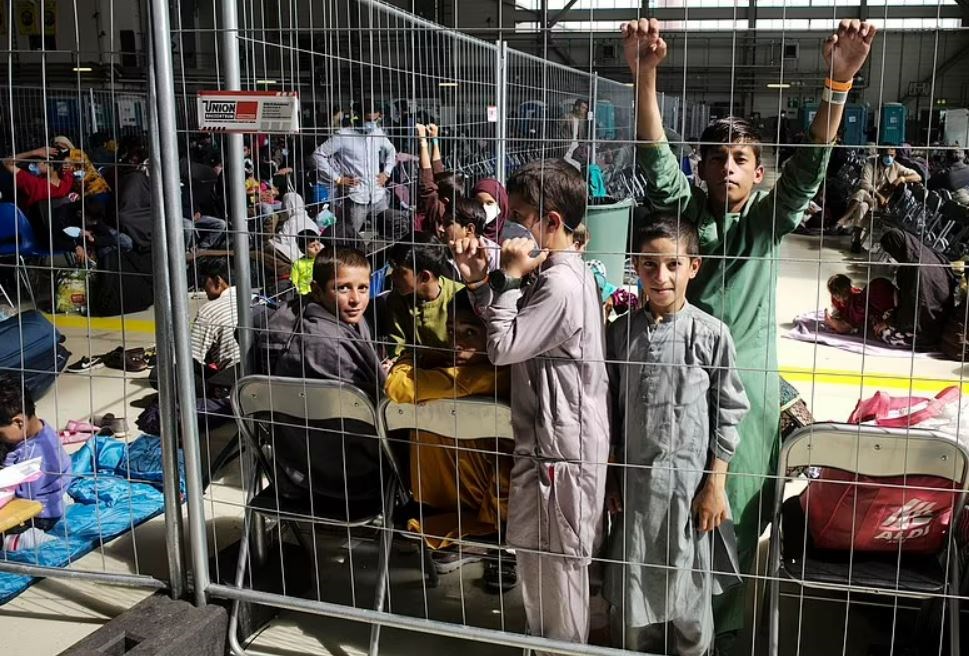Afghan child: Promised sanctuary, abandoned, now dead in US custody
A 6-year-old Afghan child died while in US federal custody, raising additional questions about the circumstances surrounding recurrent similar incidents.
-

Children and other Afghan refugees wait inside a makeshift departure gate inside a hangar at Ramstein Air Base (AP)
A 6-year-old Afghan child -- who was taken to the United States after Washington's hasty withdrawal in 2021 -- died this week while in federal government custody, making it the third such death this year, CBS News reported citing a US official.
The official, who spoke on condition of anonymity to discuss the boy's death, which has not previously been made public, claimed that the Afghan child had a fatal disease. The authorities stated that he passed away on June 13.
The little child was one of hundreds of Afghan children who were taken to the United States without their parents.
The Office of Refugee Resettlement was given custody of those children because they were brought into the country without parents or other legal guardians.
Read more: 200,000 Afghans left to their fate, still await evacuation to West
The #US, the country that wreaked havoc in #Afghanistan for 20 years, can't take care of #Afghan children in its custody after bringing them to the US without their parents, due to the absence of a system good enough to take them in. pic.twitter.com/1XJn9mZiqj
— Al Mayadeen English (@MayadeenEnglish) March 31, 2022
In a statement on Thursday, HHS affirmed the child's death, claiming that it was caused by "severe encephalopathy"; a medical term used to refer to a brain disease or disorder.
The child was brought to the United States in August 2021, according to the government, and was promptly sent to Walter Reed National Military Medical Center. After that, he was sent to the HSC Pediatric Center in Washington, D.C.
"Medical treatment was provided according to the parents' wishes and aligned with the recommendations of the hospital's health care provider team," HHS claimed in its statement. "Our heart goes out to the family at this difficult time."
Not an isolated incident
The Afghan boy's death is not an isolated incident, marking the third of an unaccompanied child in HHS custody in 2023.
A 4-year-old Honduran child passed away at Michigan Hospital in March after allegedly experiencing cardiac arrest there. According to sources familiar with the situation and a notification to Congress that CBS News was able to receive, the unaccompanied child had been in a medically precarious position for years.
The death of a 17-year-old Honduran teenager who was staying in one of the HHS shelters for unaccompanied children in Florida was made public in May, according to officials. Authorities from the federal and municipal levels are still looking into the death, which they alleged was caused by an epileptic episode.
Another immigrant child, 8-year-old Anadith Tanay Reyes Alvarez, passed away in US Border Patrol custody in May. A top Customs and Border Protection employee was fired as a result of the federal inquiry into the girl's treatment while in American custody, which was launched in response to her death.
According to early government investigations, medical contractors repeatedly turned down Reyes Alvarez's mother's pleading requests to take her daughter to the hospital. Despite agency policies directing officers to release or transfer detainees within 72 hours, the girl and her family were also kept in Border Patrol custody for more than a week.
Children who are unaccompanied and lack legal immigration status in the United States are housed by HHS. According to official data, the organization was hosting 5,922 unaccompanied youngsters as of Wednesday, the majority of whom were teens from Central America who were escaping poverty and violence.
These unaccompanied adolescents are either housed by the government until they become 18 or they can be placed with a sponsor resident in the United States, who is generally a family member. However, many Afghan children who are alone have spent a lot of time in shelters and foster homes since their relatives have either died or are still in Afghanistan.
Read next: Afghan children between US war and US abuse in 'shelters'

 4 Min Read
4 Min Read








